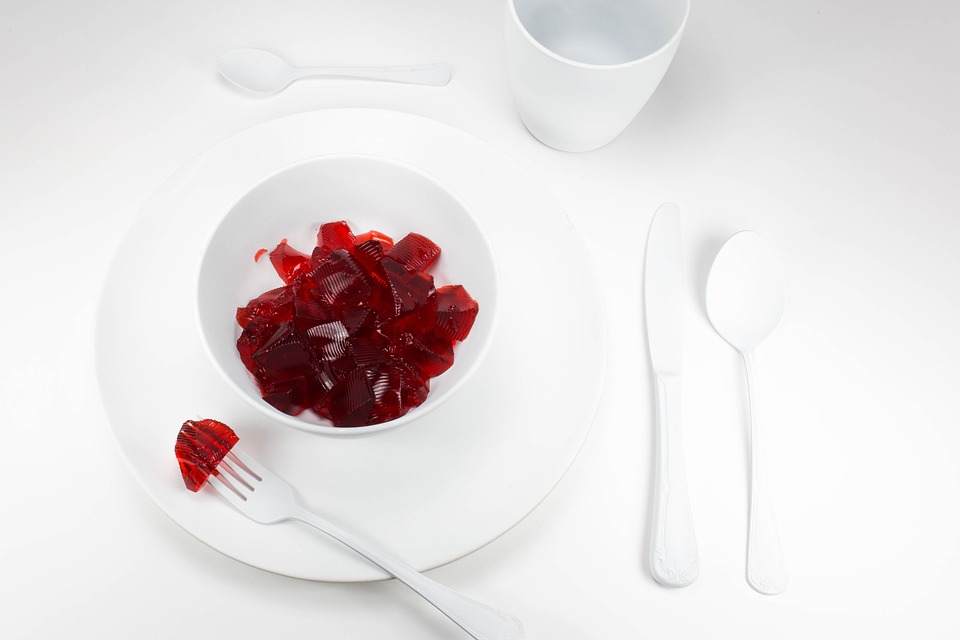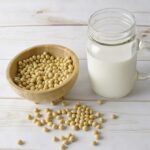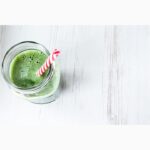If you are familiar with Jell-O, then you have likely had gelatin at some point, even if you were not aware of it. You might be surprised to know that gelatin isn’t just a fun way to make your dessert jiggle — it’s also an important source of nutrients.
What is gelatin exactly? Gelatin is a type of protein that is made from hydrolyzed collagen. It is found in animal parts that contain amino acids, which are needed to build proteins.
Gelatin’s many benefits are due to its unique amino acid profile.
What Is Gelatin?
What is gelatin made out of? Are animals killed for gelatin?
Gelatin is a form of protein that is dried out and turned into a powdery substance. Isolating and dehydrating parts of animals creates it, including skin, bones, and tissue.
Although it may not sound appealing, you likely won’t notice it’s there as it is almost clear and has no flavor.
The sugar molecule is what gives these foods their sticky, adhesive quality. Gelatin’s slipperiness is what makes it helpful for our bodies. It allows gelatin to create strong cartilage and connective tissue, which gives our bodies flexibility.
We can consume gelatin in many ways other than just processed desserts. The popularity of bone broth has increased in recent years.
Bone broth is a rich source of naturally occurring gelatin. Beef broth that contains beef bones is a good source of beef gelatin. One reason bone broth is effective in treating various conditions is that it can help improve digestion, heal a leaky gut, and reduce inflammation.
Gelatin contains amino acids such as glycine, which help to strengthen the gut lining and reduce inflammation. Glycine is a naturally occurring amino acid that can be found in food and supplements. It is used by doctors to improve digestive, joint, cardiovascular, cognitive and skin health.
Varieties
Type of gelatin you find in the baking aisle of your local grocery store is mostly flavorless and colorless. There are also flavored gelatin products, like Jell-O.
Collagen from animal connective tissue is used to make gelatin products, but the type of animal bones used is often not disclosed by manufacturers. A few brands disclose more information about the animals to help customers who uphold certain religious practices and traditions.
Some people choose not to eat pork or other pig-derived products due to dietary restrictions, such as kosher or halal. Since gelatine is often made from pigs, these products would not be suitable. However, there are some beef gelatin products that are compliant because they are made from slaughtered kosher meat. If you’re not sure what’s in a product, check for a kosher label.
There are also non-meat gelatin alternatives. These include:
- Agar-agar also called “agar” this thickener is derived from cooked, pressed seaweed. This gelling agent is available online and in some supermarkets in flaked form, powdered form, or in bars. When cooking with it, substitute agar-agar for gelatin using equal amounts if using the powdered form. If you’re using flakes, a tablespoon is equal to about a teaspoon of the powder. Certain citrus fruits require more agar-agar when substituting for gelatin in recipes. And agar-agar is not the best gelling agent for recipes that include uncooked mangoes, papaya, and pineapple.
- Pectin is a gelling agent that is found naturally in plants, especially apples and citrus fruits. Food manufacturers use pectin to make some types of yogurt and confectionery products. It is also used to enhance the mouthfeel of fruit-based beverages and can be used at home to thicken jams, jellies, and other foods.
- Carrageen is also derived from seaweed. Also called Irish moss, this thickener is usually best for making softer gels and puddings.
Gelatin Nutrition Facts
One envelope or about one-tablespoon (7 grams) of gelatin provides the following nutrition information according to the USDA. However, a full envelope may not always be equivalent to a single serving.
This means that a company that makes gelatin is more likely to say that a single serving is 1.75 grams. According to the company’s website, one serving of their product contains 6 calories, no fat, no carbohydrates, and 1.6 grams of protein. This is the equivalent of a 1/2 cup serving when mixed with water.
- Calories : 23.4
- Fat : 0g
- Sodium : 13.7mg
- Carbs : 0g
- Fiber : 0g
- Sugars : 0g
- Protein : 6g
Carbs
A tablespoon of gelatin has around 30 calories, none of which come from carbohydrates. There are no carbohydrates in gelatin, including no sugar, and no fiber.
Gelatin has no carbohydrates, so it won’t raise your blood sugar when you eat it. Although gelatin is not typically consumed alone, it is often an ingredient in desserts and other foods. This ingredient is often used to increase the thickness of desserts that are high in sugar and carbs. These items are more likely to raise your blood sugar levels. However, the addition of gelatin will not make a difference.
Fats
One tablespoon of gelatin contains zero grams of fat. A 100 gram serving of this food contains less than one gram of fat.
Protein
One tablespoon of gelatin provides about 6 grams of protein. You are likely to consume less than the text says. If you consume 1.75 grams of protein, you will not get a full gram of protein. So gelatin should not be considered a high-protein food
Vitamins and Minerals
Gelatin provides no significant vitamins or minerals. Although it is often consumed in large quantities, the powder does not provide any significant micronutrients.
Benefits
Do we actually need to supplement with gelatin?
For most people, the answer is yes. People in the past usually ate more gelatin because they would eat all parts of the animal.
Many people today lack gelatin (and other animal-based compounds like collagen) since a lot of edible animal parts are often thrown away. The parts of animals that supply gelatin naturally are the skin, bone marrow, and tendons – not the chicken breast or filet mignon.
Although our bodies can produce some amino acids, we might need more as we age or if we suffer from inflammation, poor digestion, or weak joints.
A second group of people who are probably running out of gelatin are vegetarians. Since vegetarians and vegans avoid most or all animal products, they rarely have exposure to it in their everyday lives. Instead, they typically use gelatin substitutes like agar agar.
If you consume a mostly vegetarian diet, it is important to do so carefully to avoid being low in essential amino acids. This is because a vegetarian diet eliminates “complete proteins” such as meat, fish, eggs, and dairy.
Here’s more about some of the main benefits of gelatin:
1. Improves Gut Health and Digestion
Gelatin is beneficial for preventing intestinal damage and improving the lining of the digestive tract in a similar way to collagen. This prevents permeability and leaky gut syndrome.
The gut is an important part of the body’s defense system since it helps to keep food, bacteria, and yeast particles inside the digestive system where they belong. If these particles were to leak into the bloodstream, it would trigger inflammation.
Gelatin can increase your production of stomach acids, which are necessary for proper digestion and nutrient absorption. Glycine from gelatin is important for helping the stomach lining heal and for balancing digestive enzymes and stomach acid.
If you do not have enough enzymes or stomach acid, you may have trouble digesting nutrients, experience acid reflux, feel bloated, or have indigestion. You may also develop anemia. As people age, they often experience more digestive problems because vital digestive juices are lowered during the aging process and worsened by increased stress.
Gelatin can absorb water and fluids, which can help with fluid retention and constipation.
2. Protects Joints and Lowers Joint Pain
Both collagen and gelatin have been shown to be effective in reducing the symptoms of osteoarthritis and rheumatoid arthritis. Osteoarthritis is most common in older people, and is considered to be the leading cause of frequent joint pain. As people age, they tend to develop stiffness, aches and limited mobility that worsen over time. This is because collagen continues to break down and erode as they get older.
Gelatin and collagen work together to reduce inflammation and pain, and to prevent degenerative joint diseases that can cause joint dysfunction.
Research has found that gelatin can be beneficial for people who suffer from osteoarthritis, joint pain, osteoporosis, and exercise-related injuries. Gelatin has been shown to reduce inflammation and pain in muscles and joints, as well as improve athletic abilities, in clinical trials.
3. Helps Improve Sleep Quality
Some studies have found that taking gelatin before bedtime can improve sleep quality for people who have difficulty falling asleep, stay awake during the night, or have other sleep problems.
The researchers found that gelatin improved subjective sleep quality by reducing daytime sleepiness, improving daytime cognitive functions, and reducing the amount of time it took to fall asleep. In addition, gelatin improved slow-wave sleep without affecting the normal sleep architecture.
Glycine improves sleep in a different way than traditional sleep medications or hypnotic drugs, which normally means less drowsiness and side effects the following day are experienced.
4. Lifts Your Mood and Improves Cognitive Abilities
Glycine is an amino acid that has properties similar to anti-anxiety or antidepressant medications, but without the unwanted complications and side effects.
Glycine and other forms of amino acid therapy are used to naturally boost mental clarity and calmness because certain amino acids help lower stress hormones like norepinephrine and increase happy hormones like GABA.
A deficiency in the metabolism of glycine can lead to a number of problems, including developmental issues, lethargy, seizures, and mental retardation. This is because glycine is used by approximately half of the inhibitory synapses in the spinal cord.
5. Improves Skin Health
Are you worried about developing wrinkles, sun damage, stretch marks, and other signs of aging? Gelatin and collagen can help improve your appearance by improving skin health and cellular rejuvenation.
Collagen is considered a primary building block for skin and is thought to play a role in maintaining a youthful, healthy appearance.
Gelatin can help your skin renew cells and protect you from damage caused by UV light. This can help reduce wrinkles and some types of cancer.
As we age, one of the reasons our skin begins to show signs of aging is because we start to lose collagen. For most people, this process begins in their 20s or early 30s, and only gets worse with time. Losing collagen can cause cellulite, loose skin, and fine lines because it results in skin that is less firm.
As we age, our bodies experience more wear and tear, which can be offset by extra collagen. Increasing your intake of gelatin is a good idea if you want to have healthy skin, hair, nails and teeth. Gelatin helps your body to produce new collagen, which makes these tissues stronger.
6. Helps Maintain Heart Health
Gelatin can play a beneficial role in the body by helping to neutralize chemical compounds that we acquire from eating meat. Animal products, such as meat from chicken, beef, turkey, and eggs, are high in a type of amino acid called methionine.
Excess methionine intake can lead to negative health consequences such as heart disease and other ailments, due to the increase in homocysteine levels in the blood. The more methionine we consume, the more we require other nutrients to counteract its negative effects.
High blood levels of homocysteine are associated with increased inflammation and diseases like arteriosclerosis, cardiovascular disease, stroke, and weakened bones. Impaired cognitive function has also been linked to high levels of homocysteine.
You don’t have to cut out all animal products to become healthier. Optimal health requires a balance of different nutrients obtained from your diet.
7. Maintains Strong Bones
The skeletal system needs a regular supply of nutrients to keep it strong and dense. Gelatin is packed with nutrients that are essential for strong bones, like calcium, magnesium, phosphorus, silicon and sulfur. These nutrients help to prevent fractures and loss of density. Those nutrients are also great for bone healing.
According to recent research, gelatin may be a safe and effective treatment for osteoarthritis and osteoporosis when used over a long period of time.
8. Helps You Feel Full
According to certain studies, taking gelatin supplements can help increase satiety and control hunger hormones.
Although it is not definitively shown to aid in fat loss, preliminary research suggests it may be effective in reducing appetite and increasing satiety hormones in obese adults.



